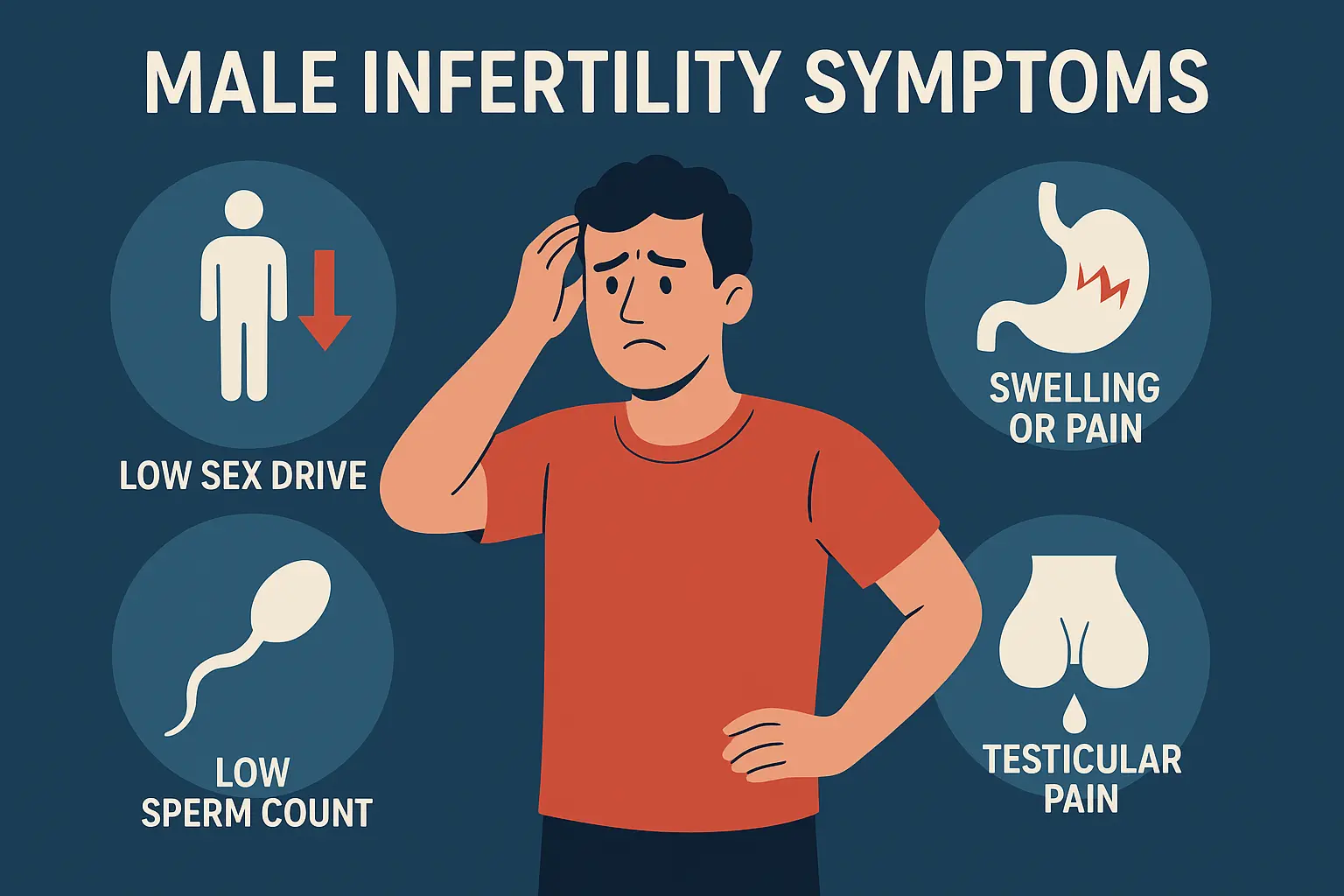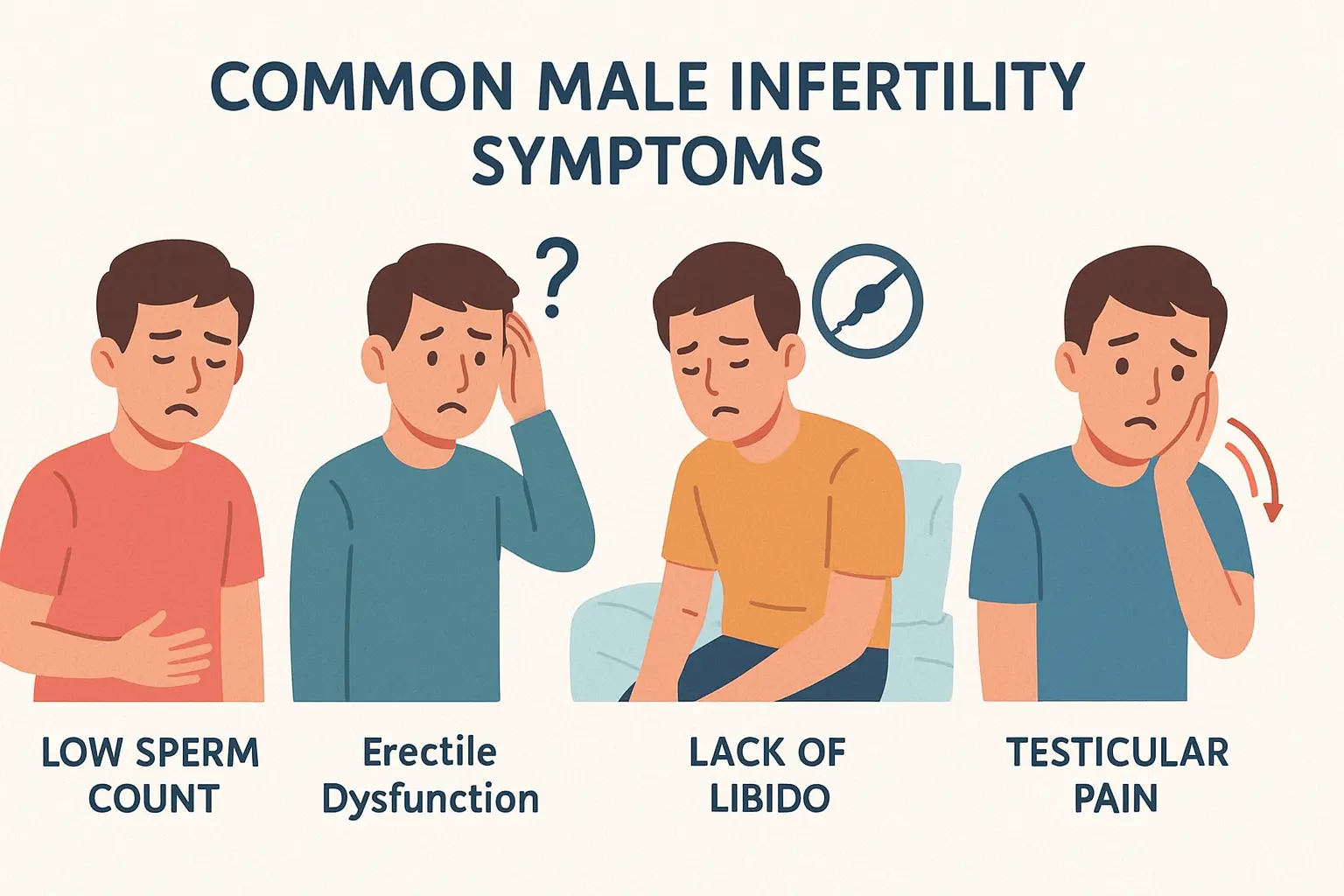Male Infertility Symptoms: When to See a Doctor and What Tests to Expect

Male infertility is the inability of a man to get his female partner pregnant, even after regular, unprotected intercourse. With an alarming increase in the infertility rate, about 10-15% men are infertile globally. And about one-third of infertility cases in couples arise from the male partner. Recognizing male infertility symptoms early can help in timely diagnosis and effective treatment.
Caused by various reasons, including sperm disorders, hormonal imbalances, anatomical irregularities, genetics, and lifestyle choices, recognizing male infertility at an early stage can improve the treatment outcomes.
In this article, we will be taking a look at the symptoms and causes of male infertility. We’ll also be discussing some practical tips to prevent or overcome infertility.
Common Male Infertility Symptoms

The major indicator of male infertility is the inability to get the female partner to conceive, even after having sexual intercourse, without any birth control measures for over a year. Often, there are no other clear symptoms or warning signs.
With that being said, certain symptoms point towards male infertility. These can be classified into sexual and physical symptoms. Some subtle signs seen in infertile men may not necessarily be related to infertility.
Sexual and Reproductive Symptoms
Infertility can affect the sexual life to an extent, causing problems like:
- Erectile dysfunction.
- Difficulty in ejaculating.
- Low libido or sex drive.
- Reduced quantity of semen.
- Premature ejaculation.
- Absence of semen during climax (anejaculation).
Physical Symptoms
There are certain physical signs commonly noticed in infertile men, such as:
- Pain or swelling in the testicles.
- Lump formation in the testicles.
- Smaller testicle size.
- Firmer testicles.
- Reduced or lack of facial or body hair due to a hormone imbalance.
- Gynecomastia.
Subtle or Indirect Signs
Other than these symptoms that are related to the sexual and reproductive health of men, there are some indirect warning signs that need not necessarily be related to fertility issues. These include:
- Respiratory problems with difficulty breathing.
- Reduced sense of smell.
- Unexplained fatigue.
Often, these symptoms are seen in men with lower sperm health.
Causes of Male Infertility
Sometimes, the causes of infertility in men are overlooked and are only realized after persistent, unsuccessful efforts of the couple to conceive. The main contributing factors are:
- Congenital Issues with the Reproductive Organs: Some men may be born with dysfunctional testicles, which affect the body’s ability to produce testosterone and other hormones that help in sperm production.
- Varicocele: Swelling or enlargement of the veins in the testicle can increase the temperature of the scrotal sack, thereby influencing sperm quantity and quality.
- Infections: Certain kinds of infections, such as epididymitis, orchitis, gonorrhea, or HIV, can affect sperm production and sperm health and cause permanent damage to the testicle.
- Ejaculation Problems: Conditions like diabetes, spinal injuries, medications, and surgery of the bladder, prostate, or urethra can cause retrograde ejaculation, where the semen enters the bladder instead of ejaculating.
- Antibodies Attacking Sperm: Certain antibodies attack sperm, mistaking them for foreign invaders, trying to eliminate them.
- Tumors: Cancers and nonmalignant tumors affect the male reproductive organs. In certain cases, surgery, radiation, and chemotherapy can also affect male fertility.
- Undescended Testicles: In some men, testicles fail to descend to the scrotum in the fetal stage, thereby decreasing the chance of fertility.
- Hormonal Imbalances: Abnormalities in the hormonal system can reduce testosterone levels, causing infertility.
- Defects of Tubules: The tubes carrying sperm may sometimes be blocked due to various reasons, including injuries from surgery.
- Defects in Chromosome: Inherited chromosomal disorders, such as Klinefelter’s syndrome (XXY Chromosome in men), cause abnormal development of the reproductive organs in men.
- Difficulties in Sex: Erectile dysfunction, premature ejaculation, pain during intercourse, hypospadias, or even problems in the relationship can lower the libido.
- Age: Men above 35 show a gradual reduction in the sperm count, affecting their fertility, which can even cause conditions like erectile dysfunction.
- Lifestyle Factors: Substance abuse, poor diet with low nutrients, obesity, stress, irregular sleep patterns, toxins in the environment, all can contribute towards a low sperm count.
When to See a Doctor?
You should see a doctor if you haven’t conceived successfully after regular, unprotected sex for over a year. If you are experiencing pain or swelling in your testicles, erectile dysfunction, irregularities in ejaculation, or an altered or low sex drive, visit a doctor and get checked for infertility.
If your family has a history of infertility, you might have a genetic predisposition. Getting checked early in such cases can help you navigate the infertility with appropriate treatment plans. The tests conducted to assess your fertility situation include genetic testing, semen analysis, and a testicular biopsy.
Prevention and Lifestyle Tips
Though not possible to completely eliminate, infertility in men can be prevented to an extent, mainly through lifestyle changes. Here are some practical tips you can follow for reducing the risk of infertility.
- Maintain a healthy weight through regular exercise and a balanced diet.
- Consuming certain food items like walnuts, whole grains, citrus fruits, berries, and pumpkin seeds can increase the sperm count.
- Avoid alcohol consumption, use of illicit drugs, and smoking, as they can negatively impact fertility.
- Managing stress and getting enough sleep can improve your overall health.
- Prevent STIs by using condoms or by being in a monogamous relationship, as sexually transmitted infections can cause infertility.
- Avoid exposure to heat, especially in the testicles, as it can reduce the sperm count.
- Limiting your exposure to toxins and chemicals can improve your reproductive health.
- Consult a doctor if you are actively trying to conceive, as they can provide personalized advice.
Male Infertility Symptoms: Final Thoughts
Infertility in men is not easy, as it can affect the overall relationship, both sexually and emotionally. Taking active steps in maintaining proper reproductive health in men can positively impact your fertility. Although lifestyle changes may not completely mitigate infertility, there are surgeries and treatments that can help you conceive.
Frequently Asked Questions
Yes, male infertility can often be treated if detected early.
Sperm count can be increased by drinking juices of gooseberry, orange, grapes, or pomegranate.
Male fertility peaks around the ages of 25-29, with high-quality sperm.
Exposure to harmful toxins, alcohol, and smoking can reduce the quality and quantity of sperm.
Even an increase of two to four degrees in the temperature of the shower can have detrimental effects on sperm production and testosterone levels.
